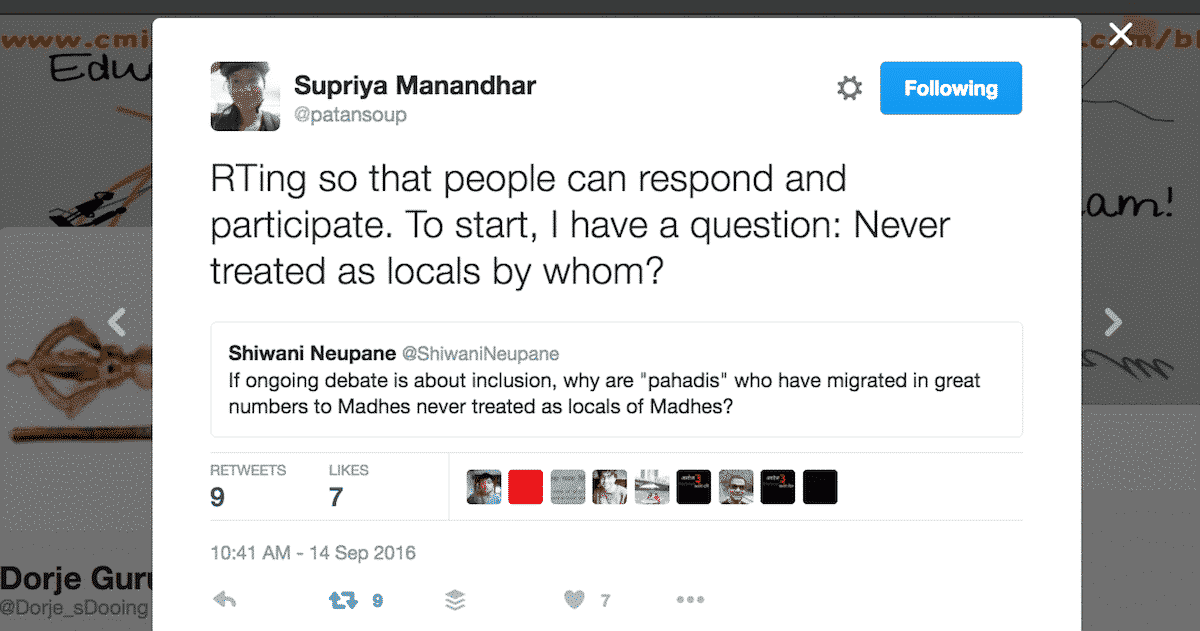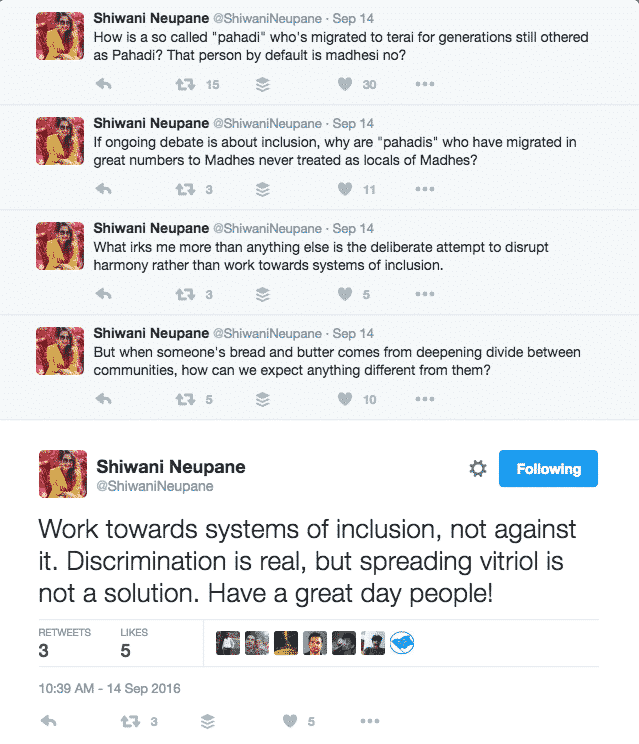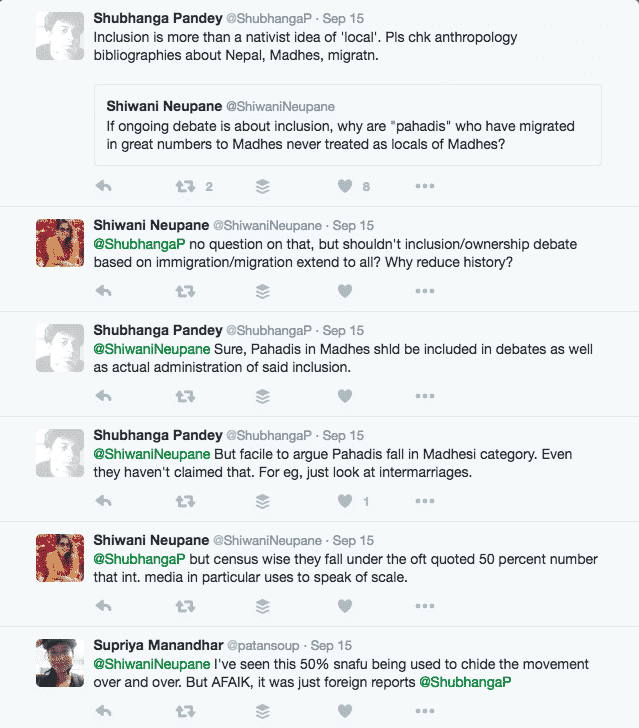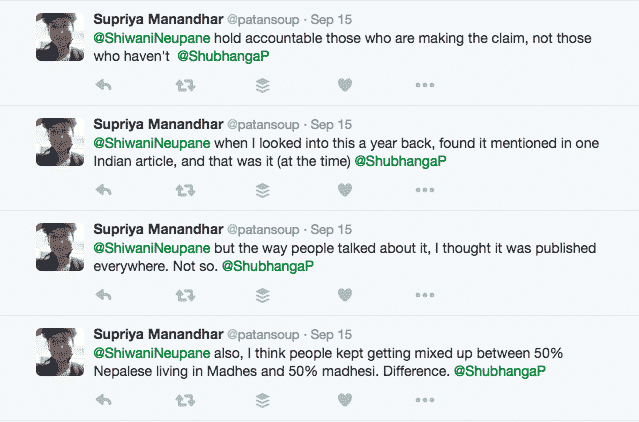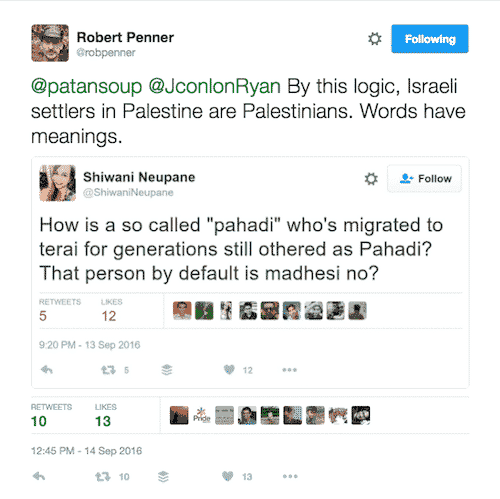It all started with the above retweet by Supriya Manandhar.
Shiwani Neupane’s retweeted tweet had been the second in a series of five that Sept. 14 morning.
I responded to the retweet with a series of tweets myself.
@patansoup @ShiwaniNeupane will have to define what she means by “local”. If by local means “Madhesi” +
— Dorje Gurung (@Dorje_sDooing) September 14, 2016
@patansoup @ShiwaniNeupane as she alludes to in another tweet she’ll have to define “Madhesi.” +
— Dorje Gurung (@Dorje_sDooing) September 14, 2016
And the tweet of hers I refer to above is the first one in her five-tweet series.
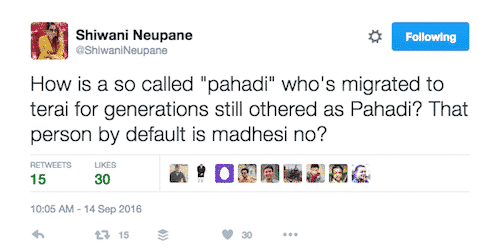
The term Madhesi denotes “someone from Madhes, the plains.” In other words, it can refer to either an indigenous person of the plains or a person who lives there. But, it’s also an ethnic slur and as such has a number of negative connotations, all of which are ONLY associated with the indigenous population.
I would be surprised if non-indigenous Nepalese residing in the plains would label themselves as Madhesis, or would want others to label them as Madhesi, given the connotations. Neupane’s or anyone’s labeling — or calling — them Madhesi does NOT make them one.
However, she, it seems, wants just that, and thereby coopt the grievances of the indigenous Madhesis, one of which is the systematic discrimination they have faced throughout the entire history of the country resulting in, amongst other things, very poor representation in the power structure!
Incidentally, Pahadi and Pahade (see below) are interchangeable. Pahadi means “people from the hills” literally, but I think, specifically, it refers to the hill so-called high caste hindus.
@patansoup @ShiwaniNeupane I know Pahade’s that live in the mountains of Mustang & Manang. I wonder how many +
— Dorje Gurung (@Dorje_sDooing) September 14, 2016
@patansoup @ShiwaniNeupane would like to be treated as “local” & would like to be called or referred to as Bhote!
— Dorje Gurung (@Dorje_sDooing) September 14, 2016
@patansoup @ShiwaniNeupane But then again…we’ll have to define what Bhote means first! 🙂 🙂
— Dorje Gurung (@Dorje_sDooing) September 14, 2016
Bhote, in Nepali language (Khas Kura) denotes, literally, “someone from Tibet” (Bhot = Tibet). (It’s the Nepali equivalent of Tibetan.) In other words, anyone who resides in or is from what used to be the State of Tibet OR in any part of geographic Tibet (the Tibetan plateau) — which, in terms of area and population, is bigger than the State — would and could be called or classified as a Bhote. The plateau extends into China, India as well as Nepal. Mustang District in Nepal, where I am from, is, for instance, part of the plateau.
Bhote, therefore, was a nationality, until the middle of the last century, and is still an ethnicity. BUT, again, being an ethnic slur and having many negative connotations, the term is reserved ONLY for people who are ethnically and culturally of Tibetan heritage, or for Tibeto-Burman people, i.e. the indigenous people (again).
And again, I would be impressed if a Nepalese of non-Tibetan heritage, who has resided — even for generations — along the mountains or North of the mountains of Nepal, would label or call themselves Bhote, or would want to be labeled or treated as or referred to as or accepted as a Bhote!
Returning to the tweets, her response to my last tweet, which appears to have been deleted, was something along the lines of those who know what she is saying understand what she means.
To which I responded with the following.
@ShiwaniNeupane In other words, ur tweet is for d converted, ie ppl who take what u say to mean what u & they want it to mean. @patansoup
— Dorje Gurung (@Dorje_sDooing) September 14, 2016
The following day, I came across a discussion on the same topic in a different thread…
I butted in to reinforce Manandhar’s tweet.
@patansoup According 2 2011 census report, 50% of pop. reside in Madhes. % indigenous Madhesi less of course. @ShiwaniNeupane @ShubhangaP
— Dorje Gurung (@Dorje_sDooing) September 15, 2016
(Breakdown of population by region in the National Population and Housing Census of 2011 appears on page 3.)
And a friend, Kanchan Jha from Madhes, asked a valid question to which Neupane also responded with a question!

To which I responded thus:
@kanchan_jha You’ll have to ask @ShiwaniNeupane about that! I grew up in KTM etc. I wonder if I’ll b counted as a Pahadi! ? @patansoup
— Dorje Gurung (@Dorje_sDooing) September 16, 2016
Manandhar chimed in saying we had good points to which I responded:
@patansoup Would love 2 b treated as “Pahadi” (& NOT Bhote) & enjoy the privileges of one! I’m sure @kanchan_jha would 2! ? @ShiwaniNeupane
— Dorje Gurung (@Dorje_sDooing) September 16, 2016
Neupane had nothing to say.
And then I addressed, with the following series of tweets, the question she raised about including the Pahadis in the inclusion debate.
@ShiwaniNeupane Not sure u r clear on the nature of exclusion the indigenous Madhesis & others are trying to get redress 4. @kanchan_jha
— Dorje Gurung (@Dorje_sDooing) September 16, 2016
@ShiwaniNeupane The inclusion debate is about #StructuralInequity & #StructuralInequality. @kanchan_jha
— Dorje Gurung (@Dorje_sDooing) September 16, 2016
@ShiwaniNeupane #StructuralInequity that provides #StructuralPrivileges to a small % of the pop. belonging 2 a specific group. @kanchan_jha
— Dorje Gurung (@Dorje_sDooing) September 16, 2016
(That “specific group” or the “privileged group,” as they are referred to in a tweet below, is the Khas-Arya, the Brahmins and the Chettris — the hill high caste hindus. For more on privilege in Nepal, read What is Privilege in Nepal?)
@ShiwaniNeupane Which has resulted in the current state of #StructuralInequality in the country. @kanchan_jha
— Dorje Gurung (@Dorje_sDooing) September 16, 2016
(For some evidence of structural inequality in the State structures, read Singha Durbar: The “Singha” That’s Lost Its Roar? and There is Poor Representation…and Then There is Nepal. Structural inequality, supported and sustained by structural inequity, has been, and continues to be, inherent in pretty much ALL our social, political and economic structures.)
@ShiwaniNeupane That is NOT to deny the neglect of & the economic suffering of those belonging to the privileged groups. @kanchan_jha
— Dorje Gurung (@Dorje_sDooing) September 16, 2016
@ShiwaniNeupane And in that group fall many of the Pahadis living in Madhes. @kanchan_jha
— Dorje Gurung (@Dorje_sDooing) September 16, 2016
@ShiwaniNeupane By arguing that they should be part of the inclusion debate, you have confused two issues. @kanchan_jha
— Dorje Gurung (@Dorje_sDooing) September 16, 2016
@ShiwaniNeupane You have confused a debate about #sructuralInequity & #EconomicInequality. @kanchan_jha
— Dorje Gurung (@Dorje_sDooing) September 16, 2016
@ShiwaniNeupane I meant, *debate about #StructuralInequity with #EconomicInequity*. @kanchan_jha
— Dorje Gurung (@Dorje_sDooing) September 16, 2016
@ShiwaniNeupane But, u might argue, “There are Pahadis in Madhes who don’t belong to the privileged groups.” @kanchan_jha
— Dorje Gurung (@Dorje_sDooing) September 16, 2016
@ShiwaniNeupane “Like the Tamangs, the Gurungs etc. Shouldn’t they be part of the inclusion debate in Madhes?” @kanchan_jha
— Dorje Gurung (@Dorje_sDooing) September 16, 2016
@ShiwaniNeupane “They are as much structurally disadvantaged as the Madhesis. Why exclude them?” @kanchan_jha
— Dorje Gurung (@Dorje_sDooing) September 16, 2016
@ShiwaniNeupane Or, maybe, that’s you have been arguing all along. Just that I didn’t understand what u were talking about! @kanchan_jha
— Dorje Gurung (@Dorje_sDooing) September 16, 2016
@ShiwaniNeupane But of course, the call of inclusive democracy, for #StructuralEquity… @kanchan_jha +
— Dorje Gurung (@Dorje_sDooing) September 16, 2016
@ShiwaniNeupane the call *for* …@kanchan_jha +
— Dorje Gurung (@Dorje_sDooing) September 16, 2016
@ShiwaniNeupane is, among other things, about proportional representation of the indigenous population in the power structure. @kanchan_jha
— Dorje Gurung (@Dorje_sDooing) September 16, 2016
@ShiwaniNeupane Madhesis, by excluding their “local” Pahadis in the inclusion debate, they are NOT saying “You don’t matter.” @kanchan_jha
— Dorje Gurung (@Dorje_sDooing) September 16, 2016
Just as when people in the US say, “Black Lives Matter!”, they DON’T mean white lives DON’T matter!
The other indigenous people of Nepal are fighting their own inclusion battles from their own constituencies.
@ShiwaniNeupane I state that, in case, that’s what you think the Madhasis, the indigenous Madhesis, r saying. @kanchan_jha
— Dorje Gurung (@Dorje_sDooing) September 16, 2016
I ended my series with the following:
.@ShiwaniNeupane Oh, indigenous Madhesis r also fighting 2 end views such as this: @kanchan_jha @Anikesh2014 pic.twitter.com/XWPOO5tJqY
— Dorje Gurung (@Dorje_sDooing) September 16, 2016
I am sure you noticed that I shared no response from Neupane. There’s a good reason for that: there were none! I wasn’t surprised though; she didn’t respond to my tweets in the past either…not that I care!
And more recently, she had the following commentary to make about a couple from two different ethnic groups tying the knot and identity politics, to which I also had a fitting response! 😀
By d same logic, Pres., Sp. of House & CJ of SC r women show #GenderPolitics has outlived its usefulness, no? #Nepal pic.twitter.com/gPuoAbMs8i
— Dorje Gurung (@Dorje_sDooing) October 17, 2016
I suspect she doesn’t know that making such a hasty generalization — that “identity politics has outlived its usefulness” — from ONE example of inter-ethnic marriage between members of two middle class families is a major logical fallacy. (I address this very fallacy and systemic institutional discrimination in my blog post Tell Me, Where is Ethnicity-based Discrimination in Nepal?!)
Neither can one make hasty generalizations about the uselessness of gender politics in Nepal based on three examples of ascension of three women to powerful positions. I wonder if she understood it though!
Besides, identity politics is bigger, much much bigger, than creating or establishing social or kinship relationships between two middle class families.
This, however, is not the first time I have had issues with her opinion and logic. I have written about them in You Don’t Have to Agree with Someone’s Opinion to Defend Their Freedom of Speech and A Nepali’s Way of Trying Hard NOT to Defame a Person.
To conclude, I want to revisit her third and fifth tweets in her five-set series.
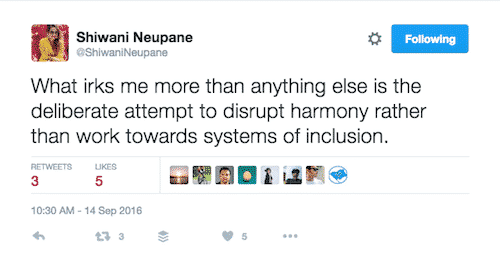
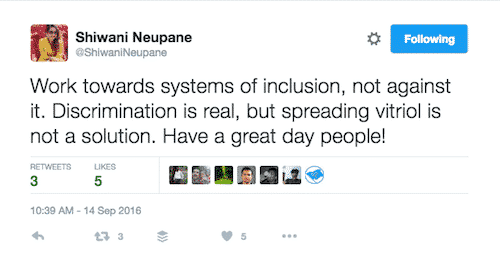
It’s truly sad to see, on the one hand, how, in her social commentaries, she wants to sound lofty, magnanimous and insightful as in the last four tweets reproduced above AND appears to want to be taken seriously, while, on the other hand, she, firstly, displays a lack of understanding of — or a reluctance to recognize — the legacy of the historical discrimination faced by different groups in the country, including the Madhesis, and, secondly, holds such lowly views of Madhesis, and, lastly, makes such logically flawed arguments.
She, who, according to her twitter profile, is a graduate of Ithaca College and that of Columbia School of Journalism in New York City!
She, who, according to Himal Khabhar, belongs to the sub-group of “Our Public Intellectuals,” namely, the “Questioning Generation.” Click here to read her entry in the magazine. (It is in Nepali.)
Or, maybe, she genuinely does not know or understand these issues and is not aware that her arguments are flawed. I certainly can identify subjects and topics that I don’t know about, or understand! And I know I am not always logical either!
Regardless, to leave you with a smile, I share two more tweets. First, Robert Penner‘s in which he uses Neupane’s logic. And then, my response to it!
@robpenner And, by the same logic, all US citizens of European heritage are Indians! @patansoup @JconlonRyan
— Dorje Gurung (@Dorje_sDooing) September 14, 2016
What do you think of all that?
* * * * * * * *
November 14 Update
In spite of — or maybe because of? — the above exchanges as well as others on the topic, Neupane went on to pen an op-ed about the exclusion of the economically disadvantaged rural “hill-elite,” the “dirt poor farmers.” She argues, “Not all people with origins in the hills of Nepal feel privileged. In fact, they may feel more isolated with labels meaning to vilify.”
You can read about what is privilege, in general, in Nepal here and how structural privilege and Khas (Neupane’s “hill-elite”) privilege are synonymous here.
Having again shown a lack of understanding of the structural issues faced by the country, speaking on behalf of the economically marginalised “hill-elites,” she concludes:
“We cannot ignore the rural poor nor can we isolate them. They cannot be silenced and should not be silenced. Instead, we must practice compassion – compassion for all who feel at a disadvantage, and compassion for all those who feel discriminated and are thus angry. We cannot be selective in our compassion for we too risk the chance of electing a Donald Trump in Nepal.”
“Work towards systems of inclusion”…”practice compassion”!! If only vacuous slogans could replace knowledge of — and redress mechanisms for — social justice issues faced by the majority of the population throughout the entire modern history of the country!
This isn’t the first time that she has displayed such blatant lack of understanding of issues she discusses and debates. In You Don’t Have to Agree with Someone’s Opinion to Defend Their Freedom of Speech, I write about how she showed a complete lack of understanding of why we defended and protected her freedom of speech on social media.
But then again, what can you expect from someone who believes that one cannot be held accountable to ones opinions.
And finally,
Would love to know what she means by “we too risk the chance of electing a Donald Trump in Nepal.” @RepublicaNepal
— Dorje Gurung (@Dorje_sDooing) November 13, 2016
(Incidentally, if you find that the op-ed is no longer available online, click here for an image. For whatever reason, MyRepublica removes old articles at some point instead of archiving them.)
References (added after publication of post)
The Record (Oct. 2017). Can we stop talking about public intellectuals? “Nepal’s cultural life faces an embarrassing fact: there are far more writings about “public intellectuals” than there are actual writings showing the public intellectual at work.” [Added Jan. 2, 2018.]
The Record (Nov. 2017). Uneven development means identity politics is here to stay. Contrary to what Neupane believes, of course, identity politics is here to stay! [Added Jan. 2, 2018.]
The Record (March, 2015). Unsustainable development. “Harmful development practices are causing Nepal’s indigenous communities to ask, who is this development for?” [Added Jan. 2, 2018.]
The Record (March, 2015). Good intentions gone wrong. “Nepal’s conservation practices are leaving indigenous communities unprotected.” [Added Jan. 2, 2018.]
Reimagining Inclusion. “[Within the elites,] there is a denial of structural power inequalities, either deliberate, cognitive or both, which are underpinned by certain discourses and subjecthood as explored below.”…”The elites and dominant social groups in general tend to defend their social position on the grounds of hard work and education.”…”The other dominant narrative is that deprivation and marginalisation exist within every communities and thus, everyone deserves equal treatment.” [Not referenced in the blog but added due to its relevance. Added on June 1, 2018.]

